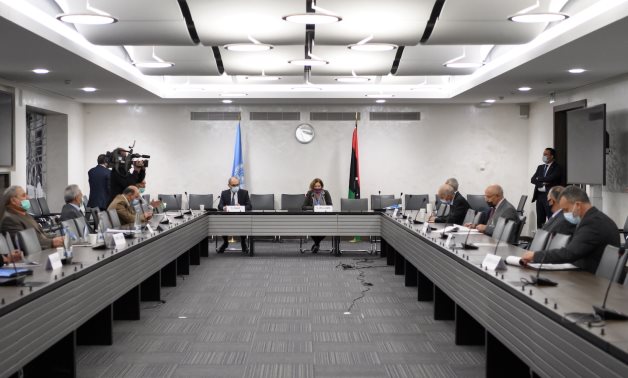
A general view of the talks between the rival factions in the Libya conflict at the United Nations offices in Geneva, Switzerland October 20, 2020 . Fabrice Coffrini/Pool via REUTERS
CAIRO - 22 October 2020: The United Nations (UN) Deputy Special Representative to Libya Stephanie William said the two Libyan delegations to the 5+5 Joint Military Commission talks have agreed on issues that “directly impact the lives and welfare of the Libyan people,” noting that the thorny work to cement a ceasefire in the restive North African country will continue.
In a press conference Wednesday, the UN envoy cited agreements to open air and land routes in the country, to work to ease inflammatory rhetoric in Libyan media and to help kick-start Libya’s vital oil industry, as talks in Geneva continued this week under William's mediation.
“I am pleased to report that the two sides have reached agreement on several important issues which directly impact the lives and welfare of the Libyan people,” she said. “I urge the two parties negotiating here in Geneva to solve all outstanding issues and forge a lasting ceasefire agreement."
Williams hailed “emerging hope” and “positive developments” for Libya’s future, while warning of socioeconomic troubles, rising cases of COVID-19, and the continued intervention and meddling of foreign powers in Libya’s internal conflict.
She said the talks took up arrangements for Libya’s central region paving the way for a cease-fire agreement.
UN organizers say the round is expected to run through Saturday. The meetings make up the security aspect of three-track talks, also involving political and economic tracks, aimed at lifting Libya out of its grueling conflict.
Williams also announced that the two parties to the conflict had agreed to continue the current state of calm on the battlefronts and to avoid any military escalation. She emphasized that the resignation of the head of the reconciliation government, Fayez al-Sarraj, would help end the transitional phase.
Williams indicated that Libya needs to end foreign interference to be able to achieve a better future, stressing that the size of foreign intervention is large and unacceptable.She drew attention to the need to protect civilians in Sirte, and called for consultations between the two parties to the conflict to be Libyan-Libyan.
In response to a question from Al Arabiya, Stephanie confirmed that confidence-building measures between the Libyan parties have already been taken.The UN envoy asserted that accountability is necessary to solve the Libyan crisis and achieve peace in the country.
Civil war broke out in Libya after the toppling of long-time ruler Muammer Gaddafi in 2011, who was later killed. Numerous militias are fighting for power and influence in the country, with Tripoli-allied militias backed by Turkey, Qatar and Italy. Meanwhile, eastern-based military commander Khalifa Haftar’s Libyan National Army is backed by the United Arab Emirates, Egypt, France and Russia.
Comments
Leave a Comment